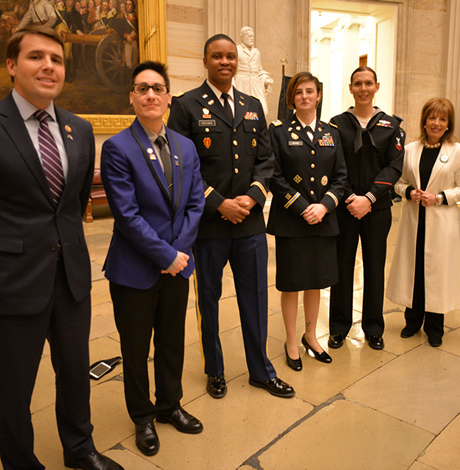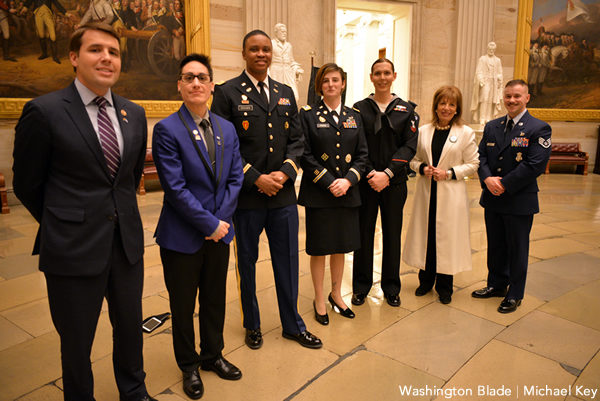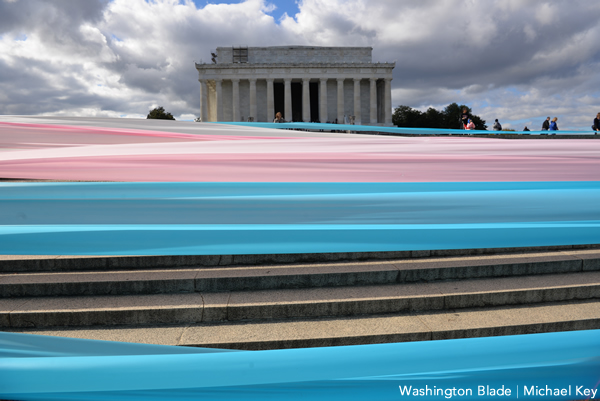News
House votes to defund trans military ban in rebuke to Trump


Rep. Chris Pappas (D-N.H.), on left, and Rep. Jackie Speier (D-Calif.), second from right, join transgender service members in the Capitol Rotunda before the State of the Union Address on Feb. 5, 2019. (Washington Blade file photo by Michael Key)
The vote on the amendment, introduced by Reps. Anthony Brown (D-Md.) and Jackie Speier (D-Calif.), was 243-183 and largely along party lines. The measure was adopted as part of $983 billion minibus legislation for fiscal year 2020 seeking to fund the Defense Department, as well as labor, health and human services, education, state-foreign operations and energy and water development.
The amendment passed with bipartisan support. Nine Republicans — Reps. Justin Amash (Mich.), Mario Diaz-Balart (Fla.), Tom Emmer (Minn.), Brian Fitzpatrick (Pa.), Anthony Gonzalez (Ohio), Trey Hollingsworth (Ind.), Will Hurd (Texas), John Katko (N.Y.) and Tom Reed (N.Y.) — voted “yes” on the measure.
However, one Democrat voted against it: Rep. Colin Peterson (Minn).
Before April, transgender people could enlist and serve openly in the military thanks to a policy change during the Obama administration. But under the new Trump administration policy, a diagnosis of gender dysphoria disqualifies potential enlistees, and a diagnosis of gender dysphoria — with the exception of transgender people already serving in the armed forces — is cause for discharge.
It’s not the first time the House has voted to rebuked the transgender military ban. In March, the chamber approved a non-binding resolution introduced by Kennedy against the Trump administration policy.
After the House approves the underlying minibus legislation, it will head to the Senate, which has yet to take up any appropriations bills for fiscal year 2020.
Any version of the spending bill with a provision against the transgender military ban would likely not fare well in the Republican-controlled chamber. (But passage isn’t impossible. Ending a filibuster on budgetary legislation requires a majority vote in the Senate, unlike the 60 votes needed to proceed with policy legislation.)
The White House has already issued a veto threat over the minibus legislation, but for reasons wholly unrelated to the transgender military ban. In a White House Office of Management & Budget Statement of Administration Policy opposes the legislation, citing concerns about raising discretionary spending caps by more than $350 billion in fiscal years 2020 and 2021 and putting the U.S. government on track to add nearly $2 trillion in deficits over 10 years.
The vote on the Brown-Speier amendment will likely not be the last word from the House on the transgender military ban. Rep. Adam Smith (D-Wash.), chair of the House Armed Services Committee, said he expects a floor vote against the policy as the part of the fiscal year 2020 defense authorization bill, which is legislation separate from the appropriations bill.
Jennifer Levi, director of the transgender rights project at GLBTQ Legal Advocates & Defenders, commanded the House in a statement for approving the amendment against the transgender ban.
“A policy that turns away qualified, dedicated Americans who want to serve their country is baseless, discriminatory, and ultimately weakens our military,” Levi said.
Shannon Minter, legal director for the National Center for Lesbian Rights, referenced in a statement on the amendment polls showing a supermajority of the American public are against the policy.
“Military leaders don’t want this ban and the American people don’t want this ban — including a growing percentage of the president’s own party,” Minter said. “We won’t stop fighting in the courts to end the ban for good and we applaud members of Congress for continuing to fight for our transgender service members as well.”
Kansas
ACLU sues Kansas over law invalidating trans residents’ IDs
A new Kansas bill requires transgender residents to have their driver’s licenses reflect their sex assigned at birth, invalidating current licenses.

Transgender people across Kansas received letters in the mail on Wednesday demanding the immediate surrender of their driver’s licenses following passage of one of the harshest transgender bathroom bans in the nation. Now the American Civil Liberties Union is filing a lawsuit to block the ban and protect transgender residents from what advocates describe as “sweeping” and “punitive” consequences.
Independent journalist Erin Reed broke the story Wednesday after lawmakers approved House Substitute for Senate Bill 244. In her reporting, Reed included a photo of the letter sent to transgender Kansans, requiring them to obtain a driver’s license that reflects their sex assigned at birth rather than the gender with which they identify.
According to the reporting, transgender Kansans must surrender their driver’s licenses and that their current credentials — regardless of expiration date — will be considered invalid upon the law’s publication. The move effectively nullifies previously issued identification documents, creating immediate uncertainty for those impacted.
House Substitute for Senate Bill 244 also stipulates that any transgender person caught driving without a valid license could face a class B misdemeanor, punishable by up to six months in jail and a $1,000 fine. That potential penalty adds a criminal dimension to what began as an administrative action. It also compounds the legal risks for transgender Kansans, as the state already requires county jails to house inmates according to sex assigned at birth — a policy that advocates say can place transgender detainees at heightened risk.
Beyond identification issues, SB 244 not only bans transgender people from using restrooms that match their gender identity in government buildings — including libraries, courthouses, state parks, hospitals, and interstate rest stops — with the possibility for criminal penalties, but also allows for what critics have described as a “bathroom bounty hunter” provision. The measure permits anyone who encounters a transgender person in a restroom — including potentially in private businesses — to sue them for large sums of money, dramatically expanding the scope of enforcement beyond government authorities.
The lawsuit challenging SB 244 was filed today in the District Court of Douglas County on behalf of anonymous plaintiffs Daniel Doe and Matthew Moe by the American Civil Liberties Union, the ACLU of Kansas, and Ballard Spahr LLP. The complaint argues that SB 244 violates the Kansas Constitution’s protections for personal autonomy, privacy, equality under the law, due process, and freedom of speech.
Additionally, the American Civil Liberties Union filed a temporary restraining order on behalf of the anonymous plaintiffs, arguing that the order — followed by a temporary injunction — is necessary to prevent the “irreparable harm” that would result from SB 244.
State Rep. Abi Boatman, a Wichita Democrat and the only transgender member of the Kansas Legislature, told the Kansas City Star on Wednesday that “persecution is the point.”
“This legislation is a direct attack on the dignity and humanity of transgender Kansans,” said Monica Bennett, legal director of the ACLU of Kansas. “It undermines our state’s strong constitutional protections against government overreach and persecution.”
“SB 244 is a cruel and craven threat to public safety all in the name of fostering fear, division, and paranoia,” said Harper Seldin, senior staff attorney for the ACLU’s LGBTQ & HIV Rights Project. “The invalidation of state-issued IDs threatens to out transgender people against their will every time they apply for a job, rent an apartment, or interact with police. Taken as a whole, SB 244 is a transparent attempt to deny transgender people autonomy over their own identities and push them out of public life altogether.”
“SB 244 presents a state-sanctioned attack on transgender people aimed at silencing, dehumanizing, and alienating Kansans whose gender identity does not conform to the state legislature’s preferences,” said Heather St. Clair, a Ballard Spahr litigator working on the case. “Ballard Spahr is committed to standing with the ACLU and the plaintiffs in fighting on behalf of transgender Kansans for a remedy against the injustices presented by SB 244, and is dedicated to protecting the constitutional rights jeopardized by this new law.”
National
After layoffs at Advocate, parent company acquires ‘Them’ from Conde Nast
Top editorial staff let go last week

Former staff members at the Advocate and Out magazines revealed that parent company Equalpride laid off a number of employees late last week.
Those let go included Advocate editor-in-chief Alex Cooper, Pride.com editor-in-chief Rachel Shatto, brand partnerships manager Erin Manley, community editor Marie-Adélina de la Ferriére, and Out magazine staff writers Moises Mendez and Bernardo Sim, according to a report in Hollywood Reporter.
Cooper, who joined the company in 2021, posted to social media that, “Few people have had the privilege of leading this legendary LGBTQ+ news outlet, and I’m deeply honored to have been one of them. To my team: thank you for the last four years. You’ve been the best. For those also affected today, please let me know how I can support you.”
The Advocate’s PR firm when reached by the Blade said it no longer represents the company. Emails to the Advocate went unanswered.
Equalpride on Friday announced it acquired “Them,” a digital LGBTQ outlet founded in 2017 by Conde Nast.
“Equalpride exists to elevate, celebrate and protect LGBTQ+ storytelling at scale,” Equalpride CEO Mark Berryhill said according to Hollywood Reporter. “By combining the strengths of our brands with this respected digital platform, we’re creating a unified ecosystem that delivers even more impact for our audiences, advertisers, and community partners.”
It’s not clear if “Them” staff would take over editorial responsibilities for the Advocate and Out.

In an official statement released at the reveal event Capital Pride Alliance described its just announced 2026 Pride theme of “Exist, Resist, Have the Audacity” as a “bold declaration affirming the presence, resilience, and courage of LGBTQ+ people around the world.”
The statement adds, “Grounded in the undeniable truth that our existence is not up for debate, this year’s theme calls on the community to live loudly and proudly, stand firm against injustice and erasure, and embody the collective strength that has always defined the LGBTQ+ community.”
In a reference to the impact of the hostile political climate, the statement says, “In a time when LGBTQ+ rights and history continue to face challenges, especially in our Nation’s Capital, where policy and public discourse shape the future of our country, together, we must ensure that our voices are visible, heard, and unapologetically centered.”
The statement also quotes Capital Pride Alliance CEO and President Ryan Bos’s message at the Reveal event: “This year’s theme is both a declaration and a demand,” Bos said. “Exist, Resist, Have Audacity! reflects the resilience of our community and our responsibility to protect the progress we’ve made. As we look toward our nation’s 250th anniversary, we affirm that LGBTQ+ people have always been and always will be part of the United States’s history, and we will continue shaping its future with strength and resolve,” he concluded.


















